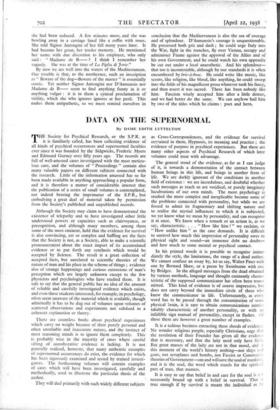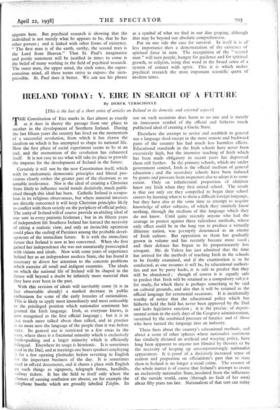DATA ON THE SUPERNORMAL
By DAME EDITH LYTTELTON
THE Society for Psychical Research, or the S.P.R. as it is familiarly called, has been collecting evidence of all kinds of psychical occurrences and supernormal faculties ever since it was founded by the Sidgwicks, Frederic Myers and Edmund Gurney over fifty years ago. The records are full of well-attested cases investigated with the most meticu- lous care, and the volumes of " Proceedings " contain also many valuable papers on different subjects connected with the research. Little of the information amassed has so far been made available in anything approaching a popular form, and it is therefore a matter of considerable interest that the publication of a series of small volumes is contemplated, not indeed bearing the imprimatur of the S.P.R., but embodying a great deal of material taken by permission from the Society's published and unpublished records.
Although the Society may claim to have demonstrated the existence of telepathy and to have investigated other little understood powers or capacities such as clairvoyance, or precognition, and although many members, among them some of the most eminent, hold that the evidence for survival is also convincing, yet so complex and baffling are the facts that the Society is not, as a Society, able to make a scientific pronouncement about the exact import of its accumulated evidence or to put forth any synthesis which would be accepted by Science. The result is a great collection of accepted facts, but unrelated to scientific theories of the nature of man and his place in the scheme of things ; evidence also of strange happenings and curious extensions of man's perception which are largely unknown except to the few physicists and psychologists who have studied them. It is safe to say that the general public has no idea of the amount of reliable and carefully investigated evidence which exists, and even those students interested, for example, in psychology, often seem unaware of the material which is available, though admittedly it has to be dug out of volumes upon volumes of scattered observations and experiments not subdued to a coherent explanation or theory.
There are countless books about psychical experiences which carry no weight because of their purely personal and often unreliable and inaccurate nature, and the instinct of most reasoning minds is to ignore Them completely. This is probably wise in the majority of cases where careful sifting of corroborative evidence is lacking. It is not generally realised, however, that many authentic examples of supernormal occurrences do exist, the evidence for which has been rigorously examined and tested by trained investi- gators. The forthcoming volumes will contain examples of cases which will have been investigated, carefully and methodically, used to illustrate the particular thesis of the author.
They will deal primarily with such widely different subjects as Cross-Correspondences, and the evidence for survival contained in them, Hypnosis, its meaning and practice ; the evidence of purpose in psychical experiences. But there are many other aspects of Psychical Research of which later volumes could treat with advantage.
The general trend of the evidence, as far as I can judge of it, is towards a demonstration of the contact between human beings in this life, and beings in another form of life. We are darkly ignorant of the conditions in another field of existence : we are incredulous, and doubtful whether such messages as reach us are veridical, or purely imaginary lucubrations of our own minds. The more psychology is studied the more complex and inexplicable become some of the problems connected with personality, but while we are forced to admit its fragmentary and shifting nature and to realise the myriad influences to which it is subjected, we yet know what we mean by personality, and can recognise it at once. We know when a remark or an action is, as we say, characteristic. . . . " How like him ! " we exclaim, or " How unlike him " as the case demands. It is difficult to unravel how much this impression of personality owes to physical sight and sound—an immense debt no doubt— and how much to some mental or psychical contact.
In his printed words it is possible to recognise imme- diately the style, the limitations, the range of a dead author. We cannot confuse an essay by, let us say, Walter Pater with one by Bernard Shaw, or a poem by Swinbume with one by Bridges. In the alleged messages from the dead obtained by various methods, language and thought eminently charac- teristic of the supposed communicator has often been trans- mitted. This kind of evidence is of course impressive, but does not carry beyond the immediate circle of those who knew the communicator in life. Unfortunately, as every word has to be passed through the contamination of some physical brain, it is rare to obtain communications unmis- takably characteristic of another personality, or with an infallible sign manual of personality, except in flashes. Of these there are however a great number of examples.
It is a tedious business extracting these shreds of evident:. No wonder religious people, especially Christians, urge that the revelation of their Founder has given all the evidence that is necessary, and that the laity need only have fain. But great masses of the laity are not in that mood, and Jr this moment of the world's history nothing—not ships and guns, not aeroplanes and bombs, not Fascist or Conununi-t theories of Government—can and will save the soul of mankind, and it is the soul, the word which stands for the spirits.] part of man, that matters.
It is easy to say that belief in and care for the soul is necessarily bound up with a belief in survival. That true enough if by survival is meant the individual as hz appears here. But psychical research is showing that the individual is not merely what he appears to be, that he has other powers ; and is linked with other forms of existence. " The first man is of the earth, earthy, the second man is the Lord from Heaven." That St. Paul's imaginative and poetic statement will be justified in times to come is the belief of many working in the field of psychical research. The outer man, the upper mind, the sixth sense, the super- conscious mind, all these terms strive to express the inex- pressible. St. Paul does it better. We can use his phrase as a symbol of what we find in our dim groping, although that may be beyond our absolute comprehension.
Put on one side the case for survival. In itself it is of less importance than a demonstration of the existence of spiritual force in man. The recognition of the " second man " will turn people, hungry for guidance and for spiritual growth, to religion, using that word in the broad sense of a system of contact with spirit. This it is which makes psychical research the most important scientific quest of modern times.











































 Previous page
Previous page